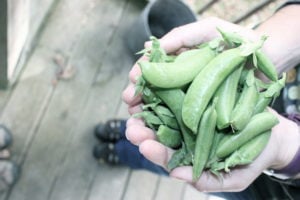A hearty hello, fellow Grow Appalachians, and welcome to 2017! 2016 brought about a lot of really exciting and wonderful changes for me, both professionally and personally, so I’m definitely looking forward to what this new year will bring.
We’re kicking off the Grow Appalachia blogs for 2017 by discussing a very important but always puzzling and mystifying subject, and that is variety selection. Yes, as in, what on Earth should I plant and grow in my garden?
Before you do your seed shopping- unless you already have, so if that’s the case, please enjoy this refresher- you might want to consider if you want open-pollinated, hybrid, or heirloom varieties. Not sure of the differences?
- Open-pollinated varieties have been pollinated by wind, insects, or birds, or other natural means (The key word here is “natural”). Given the implication of “open”, pollen can travel and flow freely between individual plants, generally resulting in more diversity. As diversity grows, so does variation, and over time certain species can become adapted to local growing conditions and climates, making some more suitable in certain regions than others. Lastly, as long as pollen is not mixed, for lack of a better word, between different varieties of the same species, then you will get true-to-type plants year after year.
- Heirlooms have been passed down within a community or family, and are the most ideal for those who practice seed-saving. Heirloom varieties must be open-pollinated, but not all open-pollinated varieties are heirlooms. Heirloom seeds are often selected because they carry a desirable trait or growing characteristic, but by and large, heirlooms are better-tasting than any other variety. Just ask any serious gardener! They also have some peculiar and strange names: Country Gentleman Corn. Arkansas traveler tomato. Greasy beans. Sugar Ann peas. Drunken woman frizzy headed lettuce (Yes, it’s real. Look it up). Each heirloom has a story behind it, just as unique as the vegetable itself. A few of our favorites are posted below.
- Hybrids are varieties that have been crossed to create a desirable trait or growing characteristic. A warning about hybrids: Saving seeds from hybrids will not produce true-to-type plants! If you plant hybrids, you must purchase new seed every year. Hybrids do have their benefits though: Hybrid varieties are usually bred in order to grow better during more inclimate weather (namely heat or cold). Hybrids can also be more disease or pest-resistant than their non-hybrid counterparts. Some hybrids are also early-producing or produce higher yields, which is advantageous if you are looking to extend your growing season or have a larger-scale growing operation.
If you are unsure as to what varieties may work best for you, perhaps try growing a combination of hybrids and heirlooms, or open-pollinated and hybrids. After all, you and your family will be the best judges for what works best!
Use It Well!
Hopefully you have a pretty good idea of what you’re looking for. Now you might want to consider how you will use the produce you grow. This is referred to as Intended Use. Do you plan to:
- Eat it? Select varieties for taste and texture.
- Sell it? Select varieties for taste, appearance (color, etc), and desirable production characteristics (disease resistance, hardiness, etc).
- Donate it? Select varieties that store well, would appear in a typical family diet, and contain high nutritional value.
- Compost it? Select varieties that produce higher quantities of biomass
- Save seed from it? Select heirlooms, plants that are disease-free, or mature fruits.
You can have more than one intended use for your production plan.
And the Votes Go to…
All right, the wait is over! Below is a small but hopefully helpful list of varieties that we at Grow Appalachia have grown and/or have grown fond of over the years. But please, don’t take our word for it! Try them out for yourself! 🙂
Beans: Junior Snelson tick bean (from eastern Tennessee!), Case knife bean, Northeaster, Fortex
Broccoli: Bay Meadows (hybrid), Belstar (hybrid)
Cucumbers: Dasher II
Cabbage: Sugar Red 80 (hybrid), generally any red varieties of leafy vegetables are more pest-resistant!
Peas: Sugar Ann Snap Pea (heirloom and All-American Selection winner)
Zucchini: Costata Romanesco (heirloom)
Peppers: Lunchbox (snack size), El Jefe (jalapeno), Olympus (F1 bell, sweet)
Tomatoes: Vinson Watts (heirloom), Sungold (cherry-size), Big Boy (F1)
What are your favorite go-to veggies? Got any tips on selecting the perfect varieties? Know any heirloom stories? We would love to hear from you, so give us a shout on Facebook, Twitter, or Instagram, or send us an email! Until next time, happy selecting!
**
Resources/Further Reading
The difference between open-pollinated, heirloom, and hybrid seeds




Leave A Comment